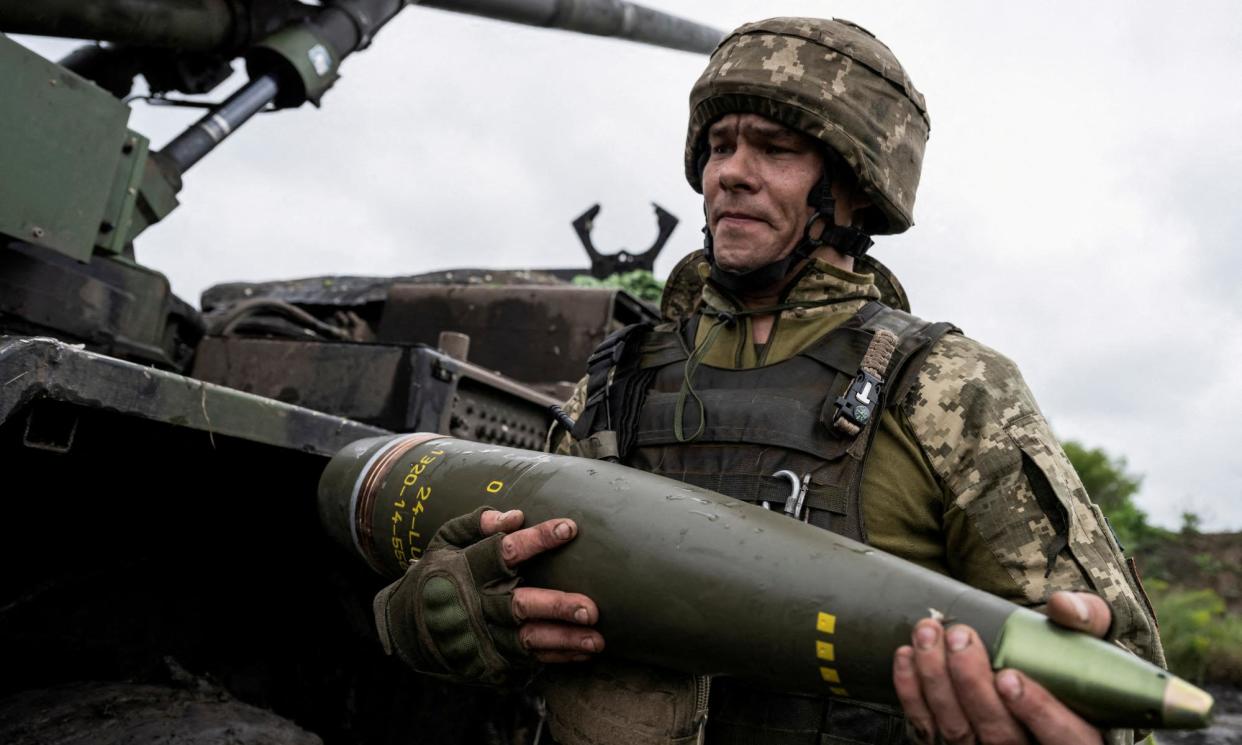Czech Republic to deliver thousands of extra artillery shells to Ukraine

The Czech Republic says it is on the verge of delivering thousands of extra artillery shells to Ukraine, just weeks after it announced an initiative to source the much-needed supplies from outside the EU.
Its foreign minister, Jan Lipavský, said it had so far secured 300,000 shells and that the ammunition would provide a vital “few months’ breathing space” on the frontline. Sources added that the first deliveries would come before June.
“We have a direct experience with 40 years of being a satellite of Moscow, being a country which was invaded in 1968 by Russian tanks to curb the Prague Spring,” said Lipavský, adding that his country could not stand by and watch Ukraine go without help. “No one really wants to bring back those [Soviet] times, and I have to say that the population is very sensitive to that.”
Ukraine has said it is falling short of ammunition against Russia; the EU has said it expects to meet only 52% of a target set last year to deliver a million shells by March, and a bill to fund US military aid to Kyiv has been held up in Congress.
Russia is ‘‘outshelling’’ Ukraine by a five-to-one ratio and Kyiv’s forces are gradually being pushed back on the battlefield. Last month Avdiivka, a frontline town, fell to the Russians after a four-month battle.
Petr Pavel, the Czech president, announced the initiative at the Munich security conference in February, saying Prague had located 800,000 shells that could be obtained with funding from a consortium of western countries.
The scheme works by European countries buying the shells from countries in Africa and Asia, such as South Korea, which are unwilling to supply them directly to Ukraine but happy to sell to a third party such as the Czech Republic. The munitions come from unused military stockpiles, but supplier nations are usually reluctant to be named.
Related: West condemns ‘undemocratic’ Russian election as results show Putin landslide
Czech sources said that the consortium had obtained serious pledges to supply 300,000 high-calibre artillery shells, with the first shipments being delivered no later than June. Nonbinding pledges for a further 200,000 had been made.
Lipavský said the Czech Republic hope to deliver the shells “within months” to help “contain Russia’s imperialistic ambitions”, increasing speculation Ukraine could have boosted stocks from June.
Lipavský said the Czechs used a combination of diplomatic and defence ministry channels to create state-to-state communications to tap supplies around the world to enable EU member states to find arms previously untapped in the war against Russia.
The foreign minister said that 18 countries had committed to the initiative and they were close to raising the required funding to buy all 800,000 shells in an initiative that was partly a response the standoff in the US Congress, which is preventing the approval of a new $60bn military aid package.
“I think that many European countries have realised how difficult the situation in Ukraine is,” a Czech source said. “At the same time, many European governments want to send a message to the US that we are seriously covering our share in order to encourage the US to do their share for the sake of defence of free world.”
The Netherlands, Denmark, Belgium, Germany, and Canada have publicly confirmed their involvement. On Monday night Sweden added its name, pledging €30m, and Canada’s defence minister on Tuesday disclosed it had donated C$40 (€27m). EU leaders are separately close to agreeing a €5bn fund for Ukraine.
Insiders said there was a close working relationship on arms for Ukraine between the Czech prime minister, Petr Fiala, and his Danish and Dutch counterparts, Mette Frederiksen and Mark Rutte. Rutte has been nominated by the US, UK and Germany to become the next head of Nato.
The three countries have so far raised €1.5bn for military supplies for Ukraine, including tanks, air aircraft systems and howitzers, and their willingness has persuaded other European nations to support them.
“Ukraine has to be able to defend itself because it defends the whole Europe,” Lipavský said. “It is not [about] Ukraine losing; it is the whole western civilisation, the principles which are now at stake and which are being challenged by Russian imperialism.”
He said the Czech initiative was “accelerated” two weeks after it was first announced at a summit in Paris attended by more than 20 countries. “President Macron has shown very strong leadership in recent months. I’m very happy for that […] Paris really put impetus into the whole thing,” Lipavský said.
The Latvian prime minister, attending a EU summit of foreign ministers in Brussels, also said Macron’s leadership was important. Krišjānis Kariņš said Macron had inserted “strategic ambiguity” into the public discussion by suggesting troops from France had to be deployed Ukraine, which was important as a counter-narrative to undermine the Kremlin.
“France sees the urgency we in the Baltics have had for the past two years. Russia will not stop, they can only be stopped. Ukraine is prepared to do the stopping but they need our assistance,” Karins added.
A senior European official praised the Prague-led effort: “The Czech initiative has proven to be very very effective. We’ll be able to provide ammunition to Ukraine in the coming weeks and months.
“Ukraine is in dire need of ammunition to defend itself against Russia attacks. We are very happy that there are so many countries are willing to contribute and join this initiative. I think it will really make a change in the battlefield,” he told the Guardian.


